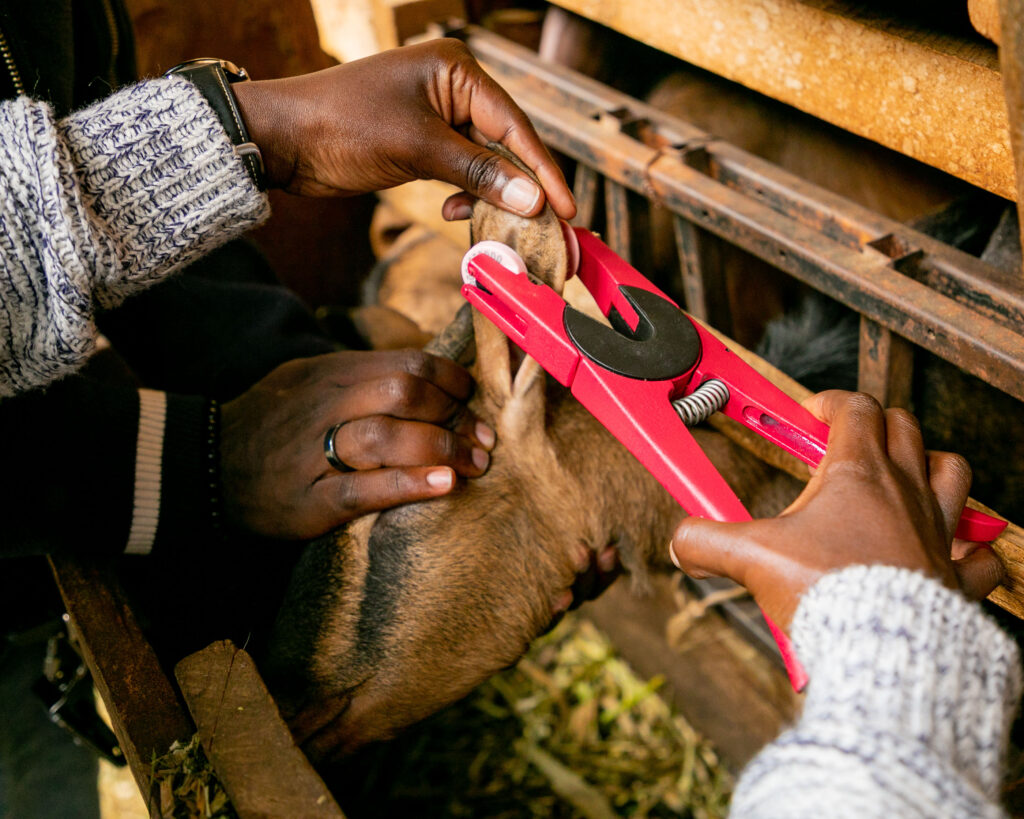
Imfuyo Veterinary officer putting an ear-tag on a goat. Photo | courtesy.
Artificial Intelligence (AI) has been touted as a technology that has the potential to disrupt every aspect of life and economy in unprecedented ways. While this is true, since AI has begun this disruption, one sector in Kenya still operates in a brick-and-mortar model. That is agriculture.
To some extent crop production has witnessed adoption of technology in production optimization, disease control and even market reach. However, livestock farmers haven’t taken up the technology due to the complex nature of livestock farming and lack of technologies to tap into.
According to Kenya Investment Authority (KenInvest), the livestock sector contributes 12 per cent of the country’s Gross Domestic Product (GDP) and 40 per cent of the agriculture sector’s GDP, employing 50 per cent of the agriculture labour force and supporting nearly six million Kenyans.
With this, the introduction of AI and other automation technologies is likely to drastically improve the livestock sector in many ways. Bernard Njathi, founder and CEO of Imfuyo, an agri-fintech start-up focusing on optimization of livestock production, says that the livestock sector is ripe for AI automation.
Improve production
According to Njathi, AI can improve livestock production by 15 per cent across the value chain because it helps in development of not only feeding and monitoring systems but also aggregating the livestock data and finding the best feeds that suits each type of livestock, resulting in feeding optimization which translates to efficient production.

“AI helps farmers to know how to feed livestock. It helps in developing a feeding plan based on the breed of cow or goat that a farmer has, the age and checking the performance for example if it’s milk, it checks the increment in milk production. It also regenerates a feeding timetable which helps farmers to know the types of feeds for a certain period of time as they monitor the production improvement,” Njathi points out.
Health monitoring
Livestock diseases is another area that AI models comes in handy as it tracks the cow’s health over time and be able to tell each time when the cow is likely to be unwell and history of treatment which makes it easier to treat and suggest prevention measures like vaccination.This helps the farmers to avoid losing livestock to preventable or treatable diseases.
“When we put an ear tag on a cow we begin recording health information from there. In farmer’s forums that we have, farmers often tell us the symptoms they see in their animals which are similar. With AI coming into play it’s easier to aggregate livestock diseases and improve efficiency of solving the problem,” he says.
Livestock sector financing
According to Njathi, agriculture financing remains low despite its huge contribution to the GDP. He says that this is a result of lack of credible data to enable financial institutions to lend to farmers.
But to achieve this, data is required for analysis with AI models and determination of credit that a farmer can receive based on the number of livestock and its value and also preventing fraudulent claims.
“There’s data and finance problems in the livestock value chain. Less than 5 percent of national credit goes to agriculture because of lack of data and financial solutions. AI systems helps financial institutions to lend to farmers based on data provided by flagging out the fraud and fagging out fake veterinary doctors,” he says.
AI models and data challenges
Njathis notes that training AI models locally remains a challenge because of lack of structured data. His company has trained AI algorithms in partnership with foreign companies which they use in helping farmers optimize production. However, he says that reaping the full benefits of AI in livestock can be realized by collecting enough data.
“AI will be hindered by the lack of data in the livestock sector in this country because we don’t have enough data. You need a lot of data to train your model in a way that it can give you an advanced outcome,” he says.
He added tha the government through the ministry of agriculture should create national livestock database to enable players in the private sector to innovate around and create solution to problems facing livestock sector in the country.




